As an ecommerce business owner, it’s hard enough to attract visitors to your website and into your sales funnel. But it’s a whole other ballgame to really understand what all of their actions mean and be able to make impactful business decisions that improve the products, services, and experiences you can offer.
Cue ecommerce CRM software. These tools can be a powerhouse for your business processes, operations, and marketing strategies. They collect a ton of helpful data while giving you access to a range of features and functions that can help you turn that data into a tangible business strategy.
Let’s take a look at what a CRM system is and some of its benefits and features, as well as the best ecommerce CRM software offerings out there.



What is an ecommerce CRM?
An ecommerce customer relationship management (CRM) platform is a type of software that stores comprehensive data about all of your online store’s visitors and customers.
By compiling data from different touchpoints and events, you’re better able to paint a holistic picture of each customer, which can, in turn, give you streamlined and actionable insights into how you can improve your performance and create a better experience for your current and future customers.
→ Click Here to Launch Your Online Business with Shopify
It can track a ton of different customer interactions with your ecommerce website, including things such as:
- Customer data, including contact details, addresses, and various preferences and settings.
- Purchase and return history, including items purchased or returned, purchase dates and times, order status, and transaction details
- Website interactions, like pages visited, products viewed, time spent on the site, and click-through rates across your online store
- Shopping cart activity, like what’s been added and whether the cart has been abandoned
- Marketing data, like when they’ve responded or purchased something from your marketing efforts, customer service conversations, and conversion rates from your marketing campaigns
- Social media engagement, like purchases they’ve made directly from social media platforms
What ecommerce CRM software does
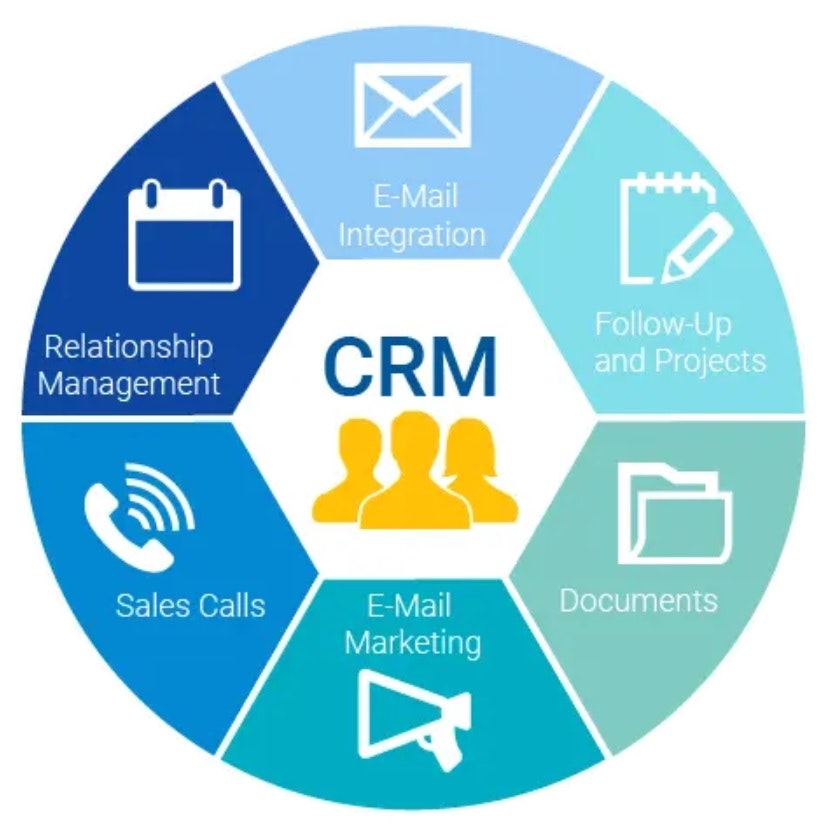
Here’s a look at what you can expect from a typical ecommerce CRM platform. (When you’re choosing the right one for your business, be sure to cross-check and make sure it has the specific functions and features you’re looking for.)
- Customer data and order management. A centralized place to access all of a customer’s data and purchase behaviors and history, as well as data for prospective customers and sales leads.
- Contact and communication management. A streamlined source of sales data, including customer communications like emails, phone calls, and support tickets. This allows you to use previous customer communications to personalize the next steps of your sales and marketing strategies.
- Marketing automation. The ability to segment customer data based on things like behavior and demographics, which helps you to create automated marketing campaigns, such as email marketing, targeted promotions, and personalized recommendations. You can also use many CRM tools to automate certain sales workflows, like sales forecasting, making sales calls, and following up with prospects (depending on your business type).
- Lead management. The ability to track potential customers (leads) and their interactions with your website, which in turn gives you the tools to nurture leads through the sales funnel.
- Ecommerce integration. Integrates with different ecommerce platforms and social media platforms to synchronize data and streamline processes, giving you a unified view of customer data and sales information.
- Analytics and reporting. Provides analytics on things like customer behavior, sales performance, and marketing campaign effectiveness, allowing you to filter data and identify patterns, then generate custom reports to fuel your team’s data-driven decision-making.
Factors for choosing the right tool
As you start the process of choosing an ecommerce CRM, it would benefit you to keep a few key factors and considerations in mind. Let’s take a look at these so you can be better equipped to make the right decision.
Ease of use
Some ecommerce CRM tools have a much steeper learning curve than others. This generally tends to be the case when the tool has comprehensive and detailed features. You should weigh the ease of use against the types of features you want and need.
Feature set
As we’ve discussed, different CRM systems will offer different types of features and functionalities. You may need to play a balancing game here too to make sure you’re covering your core needs while staying within your budget and still being able to use it easily. The four core features types are sales, communication, marketing, and reporting/analytics.
Integrations
Look for CRM software that integrates with all the third-party platforms and tools you need to run your business well. These might include things like inventory management and social media and social commerce channels.
Cost
Look at the cost as well as the pricing structure. You’ll find that many ecommerce CRMs have tiered pricing models, which limit functionality based on how much you’re paying per month or per year. You might choose to start out with a lower tier at first, then upgrade once you’ve established the need and budget for more advanced features.
Customer support
Look for a CRM that offers robust onboarding materials and support, like a self-service support library and access to customer service representatives that can answer any direct questions or problem-solving challenges that come up.
Best CRM for ecommerce
1. Salesforce
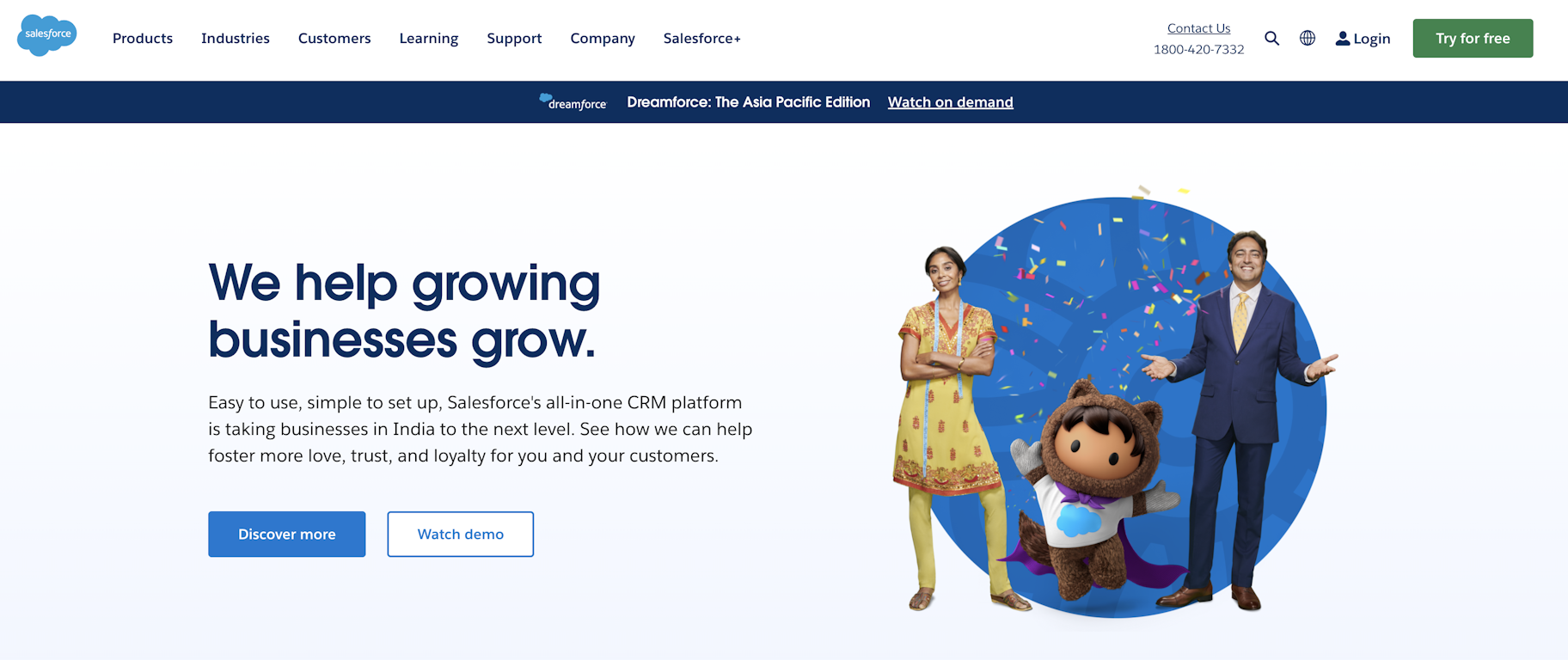
Salesforce is a top CRM choice for B2B and B2C businesses. It helps teams from sales, marketing, IT, and more collaborate effectively. You can also use Salesforce to manage sales and monitor customer activities on your storefront.
Key features:
- Lead tracking and management
- Sales data collection and tracking
- Customizable reports and dashboards for real-time insights
- Account and contact management (with a focus on contact details and customer activity)
2. HubSpot
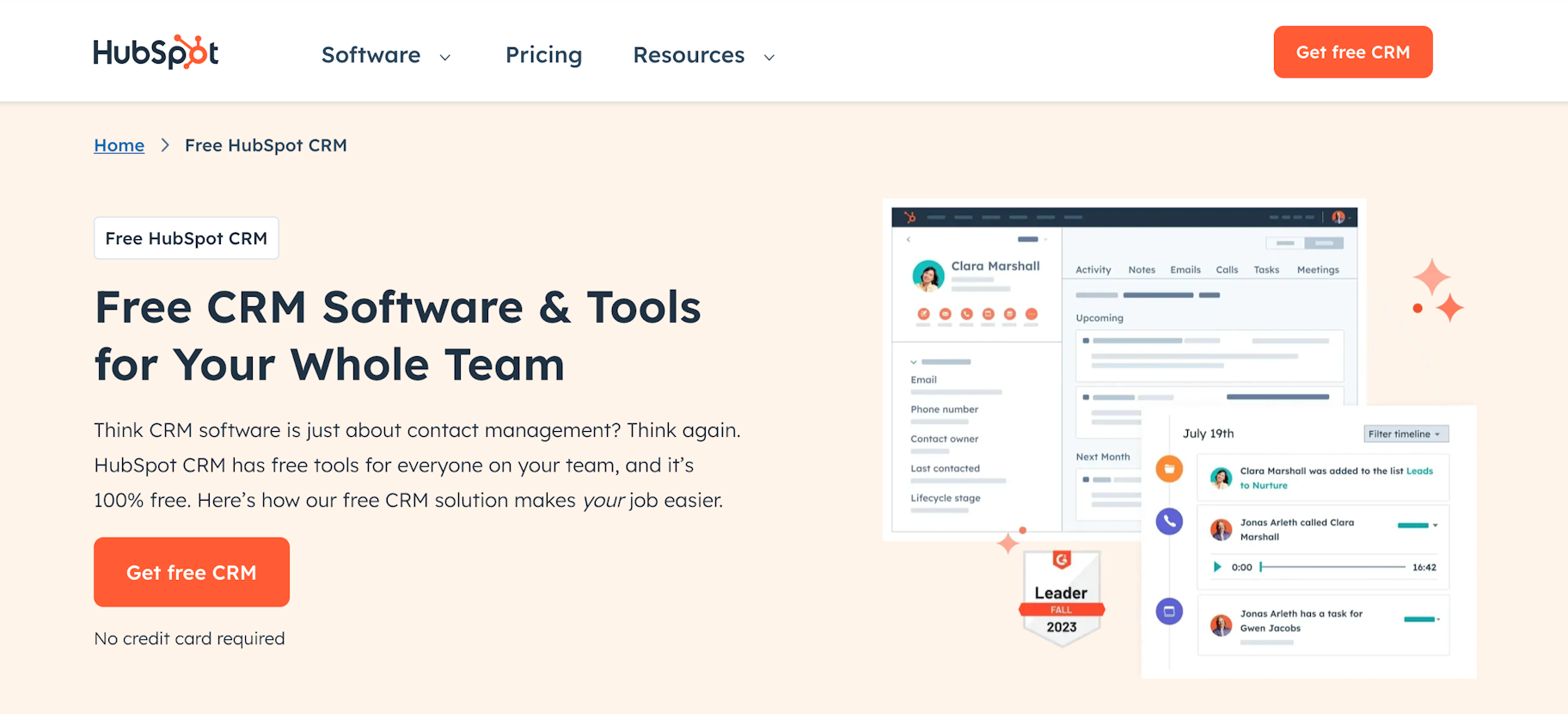
HubSpot has a large customer base, with over 190,000 users in more than 120 countries. It’s known for combining marketing automation with intuitive visual elements in a format that’s easy to use. This is particularly useful for ecommerce businesses, as they can tailor HubSpot’s workflows to fit the unique identity of their brand.
Key features:
- Email tracking
- Pipeline management
- Call tracking and meeting scheduler
- Sales automation and reports
3. Zoho
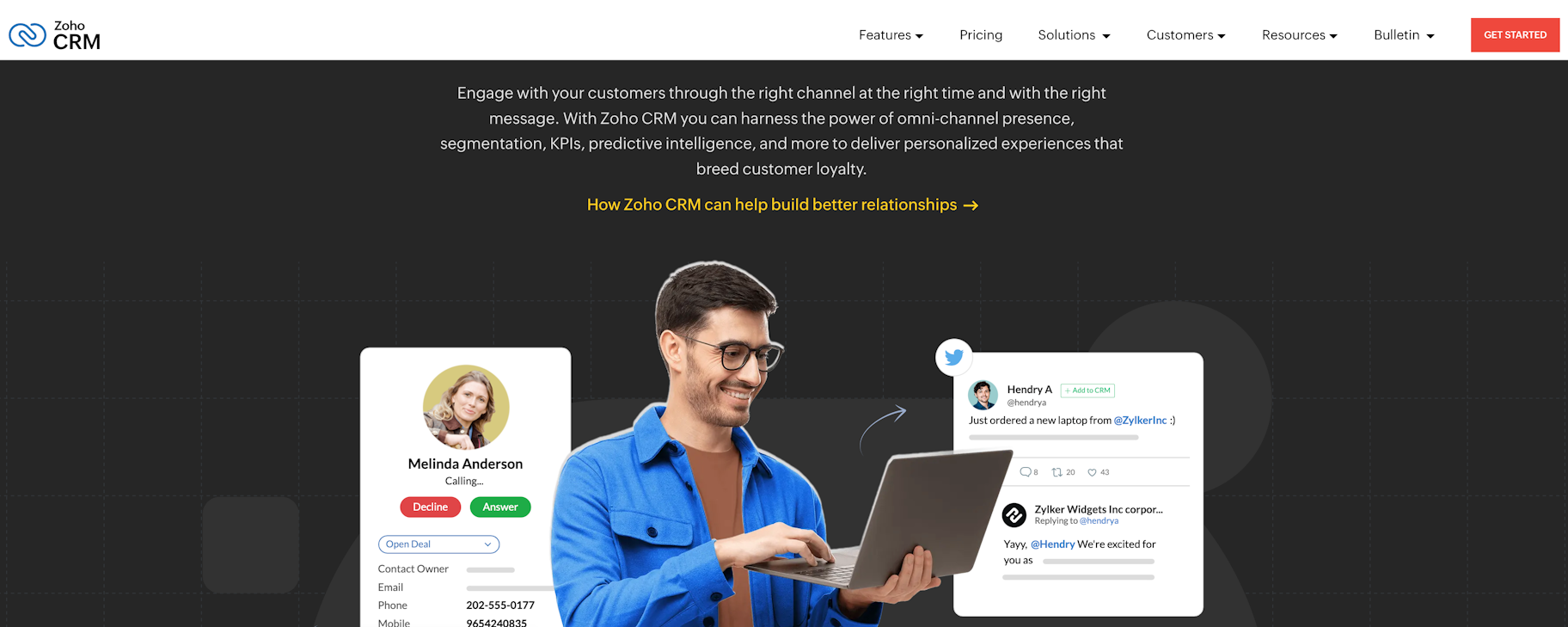
Zoho is a versatile CRM that allows you to categorize and continuously monitor customer interactions. It comes equipped with tools to track customer activity across various platforms. Plus, you can use Zoho’s self-service portal to provide a space where customers can view your products and make purchasing decisions.
Key features:
- Sales enablement
- Marketing and funnel automation
- Inventory management
- Advanced analytics
4. Nutshell CRM
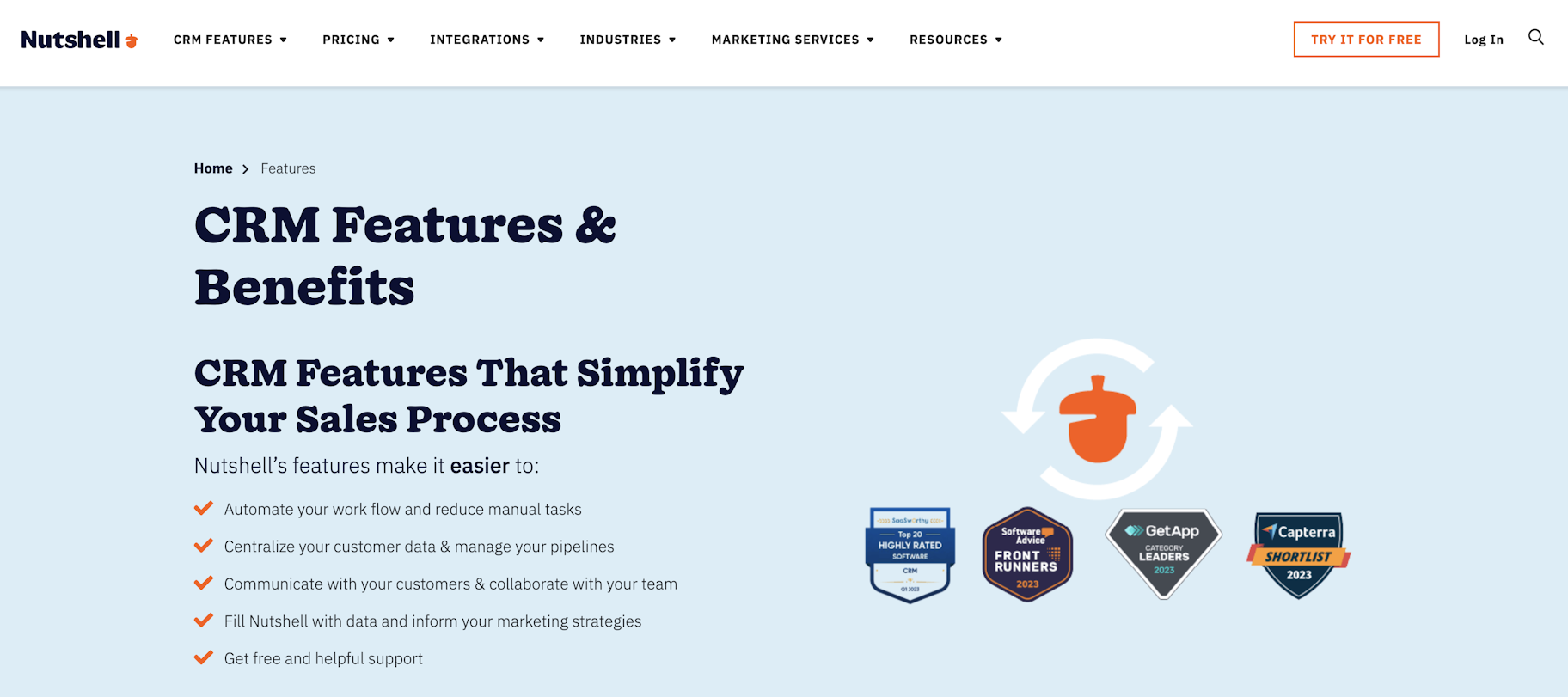
Nutshell CRM has excellent contact management features. You can use it to store your customers’ details, including their purchase frequency, customer support tickets, and how they interact with your business.
Key features:
- Sales pipeline management
- Centralized campaign management
- Automated ROI tracking
- Audience behavioral insights
5. Pipedrive
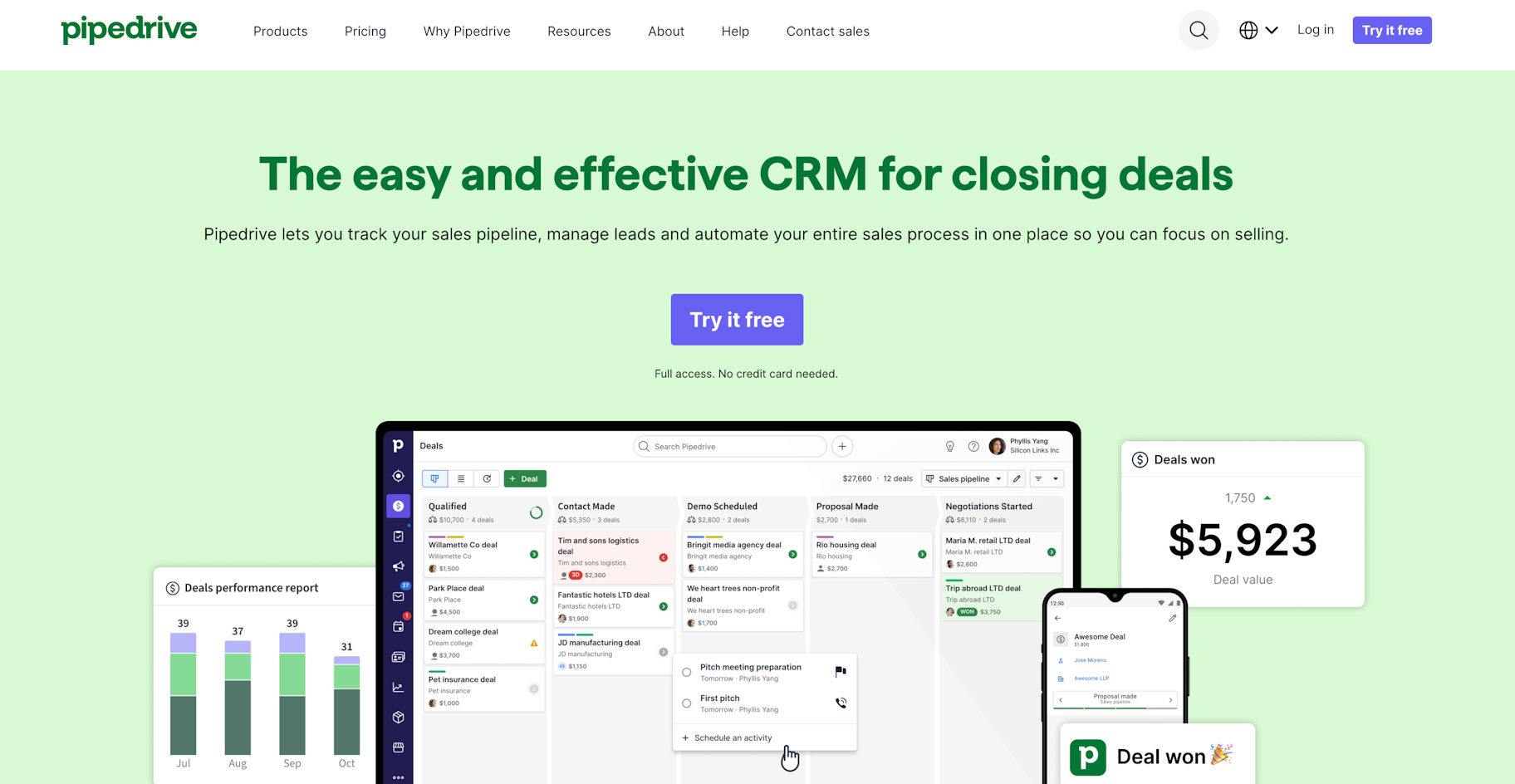
If you’re looking for a CRM to help organize your ecommerce sales funnel, Pipedrive is worth checking out. It’s packed with handy features like managing contacts and leads, tracking deals, and visually showing your sales pipeline. This makes it easy to see where each potential sale stands.
Key features:
- Email templates
- Lead logging
- Customizable reports
- Workflow automation
6. Capsule CRM

Capsule CRM is both simple and effective. In just a few clicks, you can manage customer details, track sales opportunities, and set up email campaigns. Its straightforward design makes it easy for anyone to navigate, from beginners to seasoned CRM users.
Key features:
- Contact management
- Task management
- Sales pipeline forecasting
- Sales analytics
7. Freshmarketer
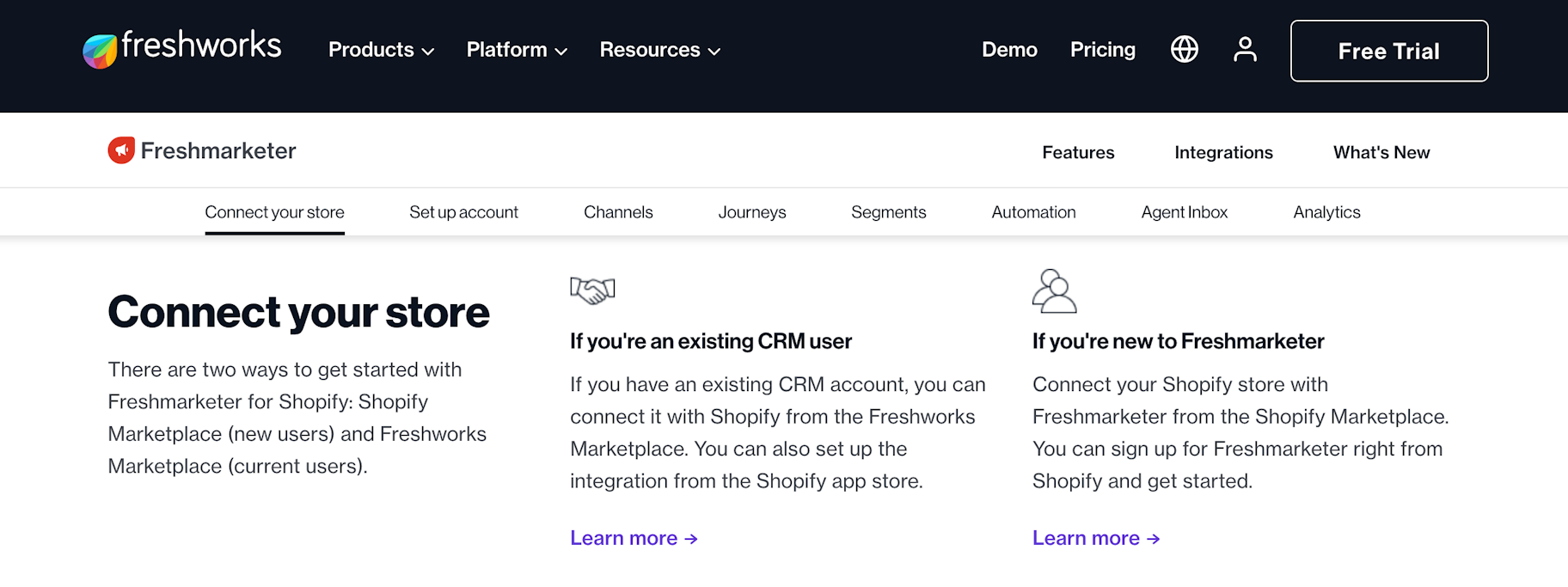
Freshmarketer by Freshworks is a marketing-focused CRM. It streamlines targeted campaigns, supports multichannel interactions, and facilitates repeat purchases, all within a user-friendly platform tailored for ecommerce stores.
Key features:
- Pre-build campaign playbooks
- Audience segmentation
- Marketing automation
- Campaign analytics
Better tools, better business
If you’re just starting out, you may be able to get by without a CRM. But if you’re a growing business, it’s strongly recommended to make the investment. These tools can have incredible benefits for your business, giving you an eagle’s-eye view into your customers’ behaviors, needs, and wants—and the things you can do to better meet them.






